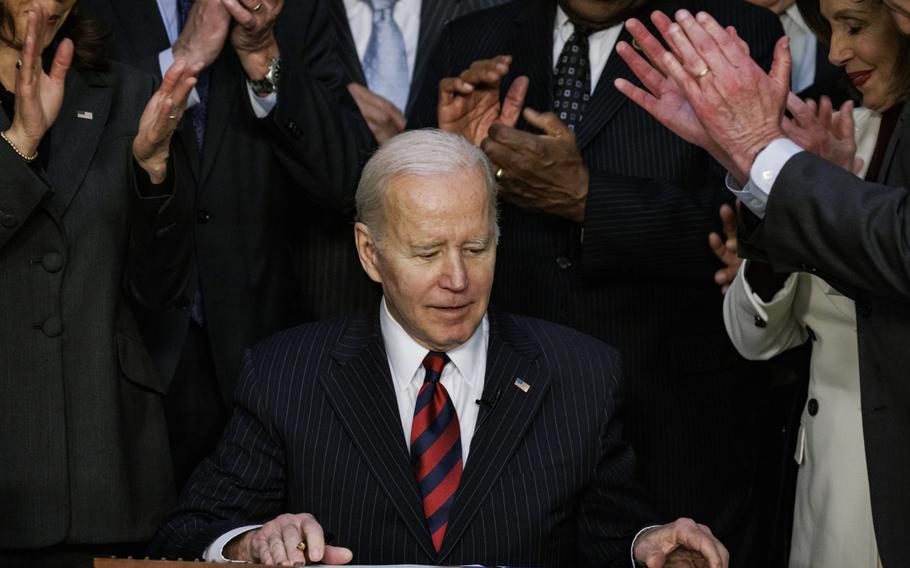
President Biden signs H.R. 2471, the “Consolidated Appropriations Act, 2022,” in the Indian Treaty Room of the White House in Washington, D.C., on March 15, 2022. On Friday, Dec. 23, 2022, Biden signed the 2023 National Defense Authorization Act, an annual law that outlines defense priorities and spending. (Samuel Corum/Bloomberg)
President Joe Biden on Friday signed into law the $847 billion defense policy bill, which will give U.S. service members their largest raise in decades and end the Pentagon’s coronavirus vaccine mandate.
Biden approved the James M. Inhofe National Defense Authorization Act for Fiscal Year 2023 — named for the retiring Republican senator from Oklahoma — behind closed doors at the White House. He issued a statement noting he opposed some measures in the bill, including long-held limits on transfers of Guantanamo Bay detainees. However, he did not mention the controversial reversal of the virus vaccine requirement for troops, which he had opposed.
Biden wrote the annual bill “provides vital benefits and enhances access to justice for military personnel and their families, and includes critical authorities to support our country's national defense, foreign affairs, and homeland security.”
The bill increased U.S. defense funding by some $45 billion from the request made by Biden earlier this year. About $817 billion is for the Pentagon and another $30 billion is for nuclear activities in the Energy Department. Its passage comes nearly three months after the fiscal year began Oct. 1.
The 2023 NDAA gives troops and Defense Department civilian employees a 4.6% raise beginning Jan. 1 and adds new money for special pay and bonuses for some service members, expands eligibility for the military’s Basic Needs Allowance, and mandates reimbursements for military spouses who need to reapply for teaching, nursing and other professional licenses due to military moves.
The roughly 4,000-page bill also boosts efforts to counter China’s and Russia’s military ambitions with heavy investments in new technologies such as hypersonic weapons, artificial intelligence and nuclear weapons modernizations.
But the bill also ends one of Biden’s former top priorities in making the coronavirus mandatory for U.S. service members. Republican lawmakers successfully included the measure that rescinds Defense Secretary Lloyd Austin’s August 2021 order requiring troops to receive the coronavirus inoculation or face punishment, including dismissal from the military. Some 8,200 service members were discharged from the military this year for refusing the vaccine.
Republicans also tried to include a measure in the NDAA that would force the military services to reinstate those service members who were discharged because of the mandate, but that effort failed.
The Pentagon has not said what it plans to do now that the vaccine requirement has been ended. Defense Department spokespeople this week said they could not yet comment on the issue.